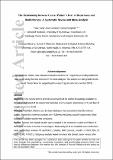Files in this item
The relationship between cancer patient's fear of recurrence and radiotherapy : a systematic review and meta-analysis
Item metadata
| dc.contributor.author | Yang, Yuan | |
| dc.contributor.author | Cameron, Josie | |
| dc.contributor.author | Humphris, Gerry | |
| dc.date.accessioned | 2017-08-10T23:34:21Z | |
| dc.date.available | 2017-08-10T23:34:21Z | |
| dc.date.issued | 2017-06 | |
| dc.identifier | 244565795 | |
| dc.identifier | 7635d2fa-5807-4d07-8d77-666ffccfef0b | |
| dc.identifier | 27419668 | |
| dc.identifier | 84992517644 | |
| dc.identifier | 000405228100003 | |
| dc.identifier.citation | Yang , Y , Cameron , J & Humphris , G 2017 , ' The relationship between cancer patient's fear of recurrence and radiotherapy : a systematic review and meta-analysis ' , Psycho-Oncology , vol. 26 , no. 6 , pp. 738-746 . https://doi.org/10.1002/pon.4224 | en |
| dc.identifier.issn | 1057-9249 | |
| dc.identifier.uri | https://hdl.handle.net/10023/11425 | |
| dc.description | The authors are also grateful to the Breast Cancer Now for supporting this research (grant reference number 6873). | en |
| dc.description.abstract | OBJECTIVE: This review aims to provide an overview of the current knowledge available on the nature and extent of the relationship between external-beam radiotherapy (RT) and fear of cancer recurrence (FoR). METHODS: PubMed, MEDLINE and EMBASE databases were searched to identify relevant studies. Systematic review procedures were followed including a quality assessment. Meta-analysis of suitable studies was conducted. RESULTS: Twenty-five eligible studies were included in the systematic review and 15 of them were included in further meta-analysis. Meta-analysis of the available data confirmed a weak relationship between RT and FoR (15 studies, 9567 patients, overall r = 0.053, 95%, CI: 0.021-0.085, P = 0.001). Subgroup analysis based on cancer site (breast cancer versus other types of cancer) revealed that the correlation between RT and FoR was statistically significant in 'other cancer' group (P˂0.001) but was nonsignificant in 'breast cancer' group (P = 0.538). CONCLUSIONS: While meta-analysis reports a statistically significant association between cancer patient's FoR and the receipt of RT, these results should be interpreted with caution due to significant variability between studies. Further longitudinal studies should be conducted to address the trajectory of FoR over RT in greater detail. | |
| dc.format.extent | 9 | |
| dc.format.extent | 872293 | |
| dc.language.iso | eng | |
| dc.relation.ispartof | Psycho-Oncology | en |
| dc.subject | Radiotherapy | en |
| dc.subject | Fear of recurrence | en |
| dc.subject | Cancer | en |
| dc.subject | Oncology | en |
| dc.subject | Meta-analysis | en |
| dc.subject | RC0254 Neoplasms. Tumors. Oncology (including Cancer) | en |
| dc.subject | SDG 3 - Good Health and Well-being | en |
| dc.subject.lcc | RC0254 | en |
| dc.title | The relationship between cancer patient's fear of recurrence and radiotherapy : a systematic review and meta-analysis | en |
| dc.type | Journal item | en |
| dc.contributor.institution | University of St Andrews. School of Medicine | en |
| dc.contributor.institution | University of St Andrews. WHO Collaborating Centre for International Child & Adolescent Health Policy | en |
| dc.contributor.institution | University of St Andrews. Health Psychology | en |
| dc.contributor.institution | University of St Andrews. St Andrews Sustainability Institute | en |
| dc.identifier.doi | https://doi.org/10.1002/pon.4224 | |
| dc.description.status | Peer reviewed | en |
| dc.date.embargoedUntil | 2017-08-10 | |
| dc.identifier.url | http://onlinelibrary.wiley.com/doi/10.1002/pon.4224/full#footer-support-info | en |
This item appears in the following Collection(s)
Items in the St Andrews Research Repository are protected by copyright, with all rights reserved, unless otherwise indicated.

